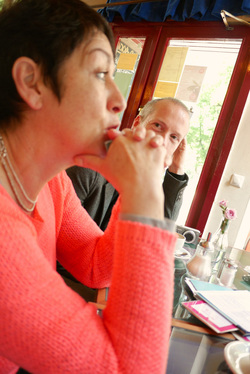
He/she seems to enjoy solitary experience and may be focused on work and on dealing with physical objects.
He/she values boundaries, and may constantly place them between him/herself and his/her partner.
In the classical cartoon image, the man reads the newspaper at the breakfast table while his furious wife attempts to circumvent this thin but impermeable barrier. Today he/she may be absorbed in his/her computer or television.
Some people remain emotionally distant out of habit.
They grow up in families where there wasn't much closeness, and they are uncomfortable when their partner attempts to be close to them. Intimacy simply seems alien.
Other Distancers grew up with an emotionally intrusive parent. They avoid closeness because when they were children it came at a high price. "If I let my mother know what I was upset about something," one woman said, "it was like inviting an ambulance into your house. She would come roaring in with all kinds of help. I soon learned to keep my problems to myself."
Another man spoke about his mother's interest in his romantic life when he was a teenager. "My mother was too interested in what I did with girls. She would find out I was dating someone, and before I knew it she had met the girl's parents and was tracking my every move. After a while, I kept my interests a secret. I suppose I began to live a double life."
So when we notice the opposite type of individual, The Pursuer, we can see how conflict can occur.
This individual is unremittingly enthusiastic about emotional closeness. The individual forever is strategizing and wanting a close intimate relationship and does whatever they can to achieve this goal. He/she is expansive and wants to cross emotional boundaries between self and others. In addition to desiring closeness, he/she also fears rejection. Because efforts have been met with disappointment, his/her anxious irritable approach to his/her partner's partly engenders the very response he/she fears.
Many individuals struggle with both set of dynamics.
They may have been over involved with their mothers, and based on that relationship, may expect an unrealistic level of intimacy in marriage. They may also have had traumatic rejection experiences. A great many men and women have deficiencies in their relationships with their fathers and bring these emotional needs to the marriage.
The Fragile Bond - Napier
 RSS Feed
RSS Feed
